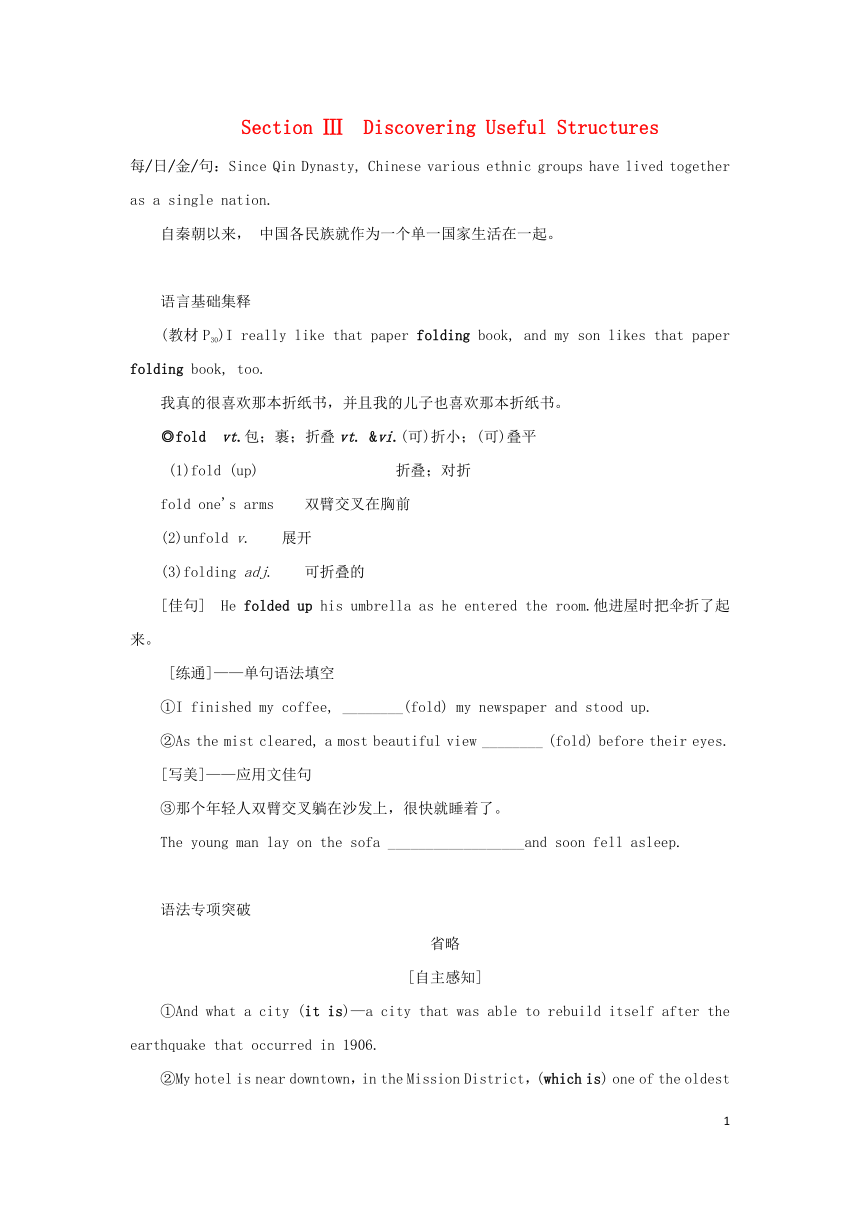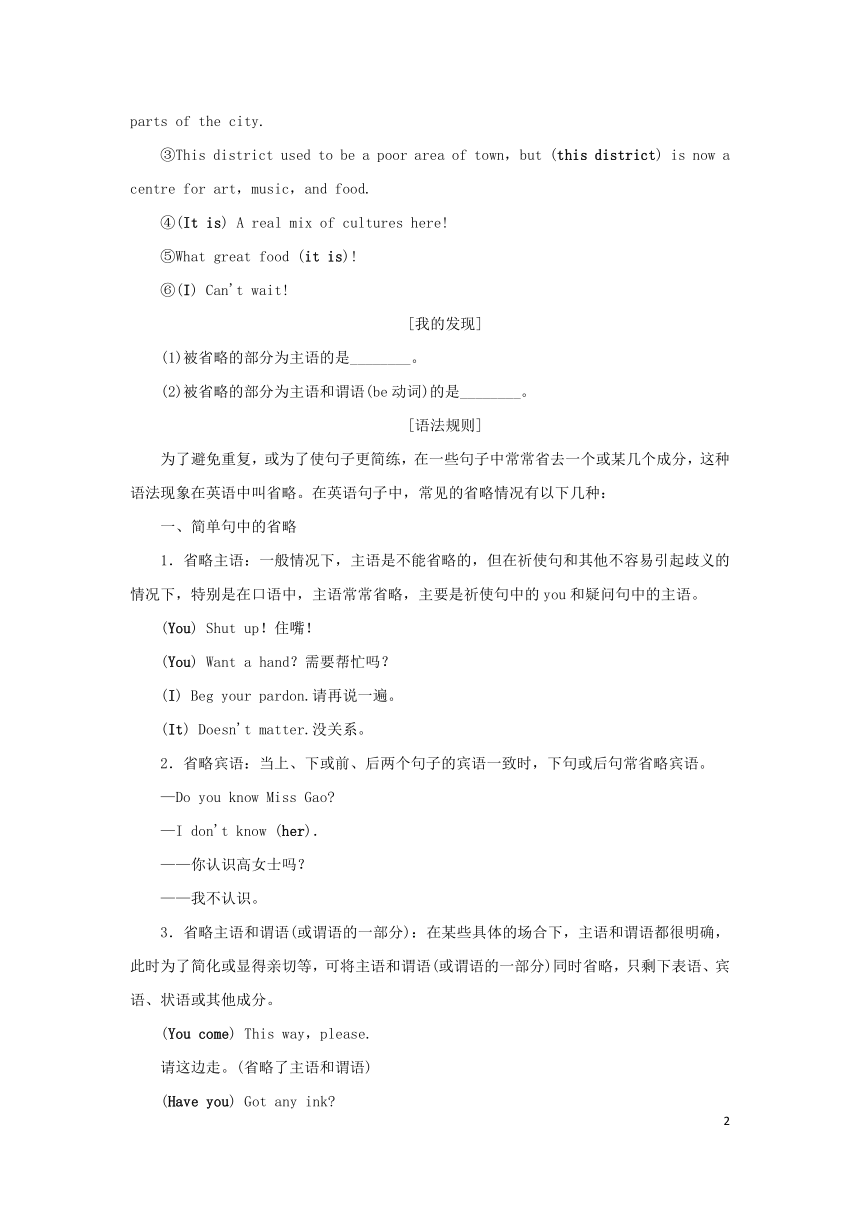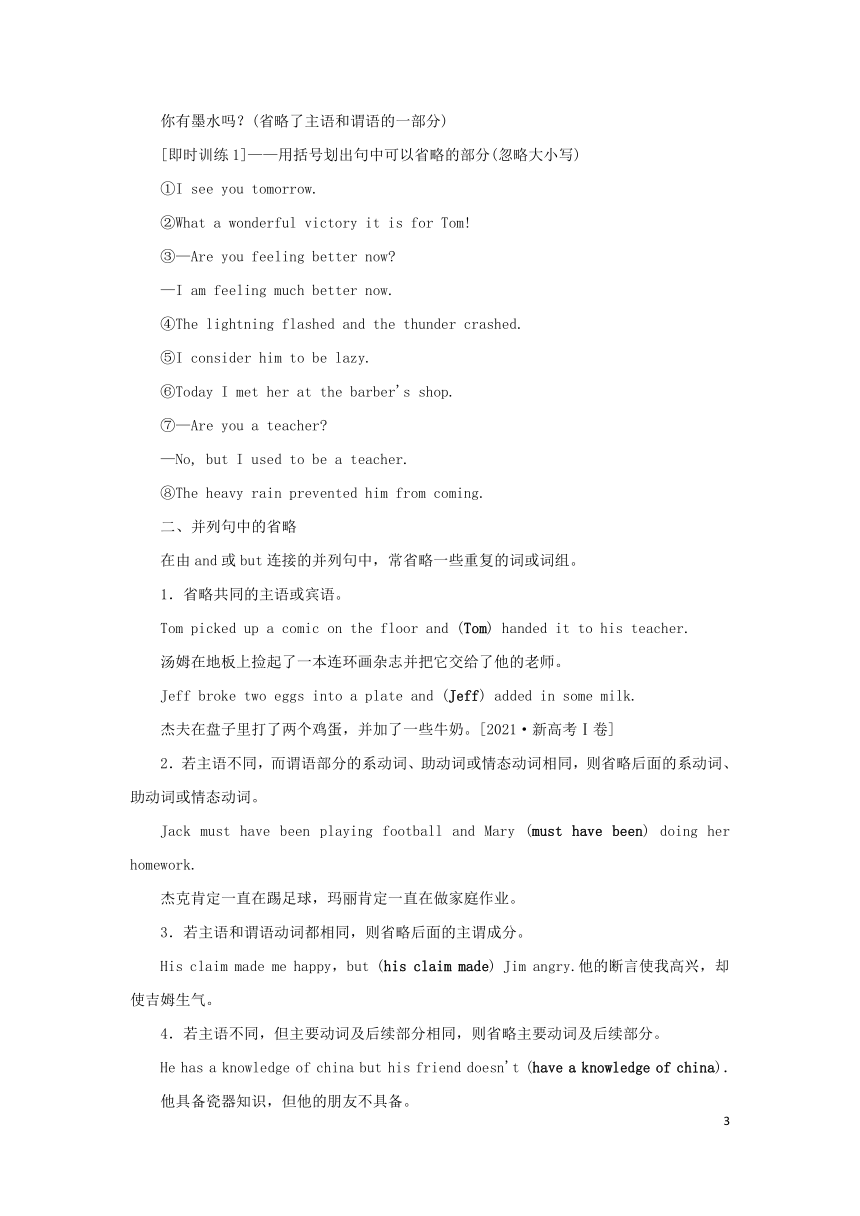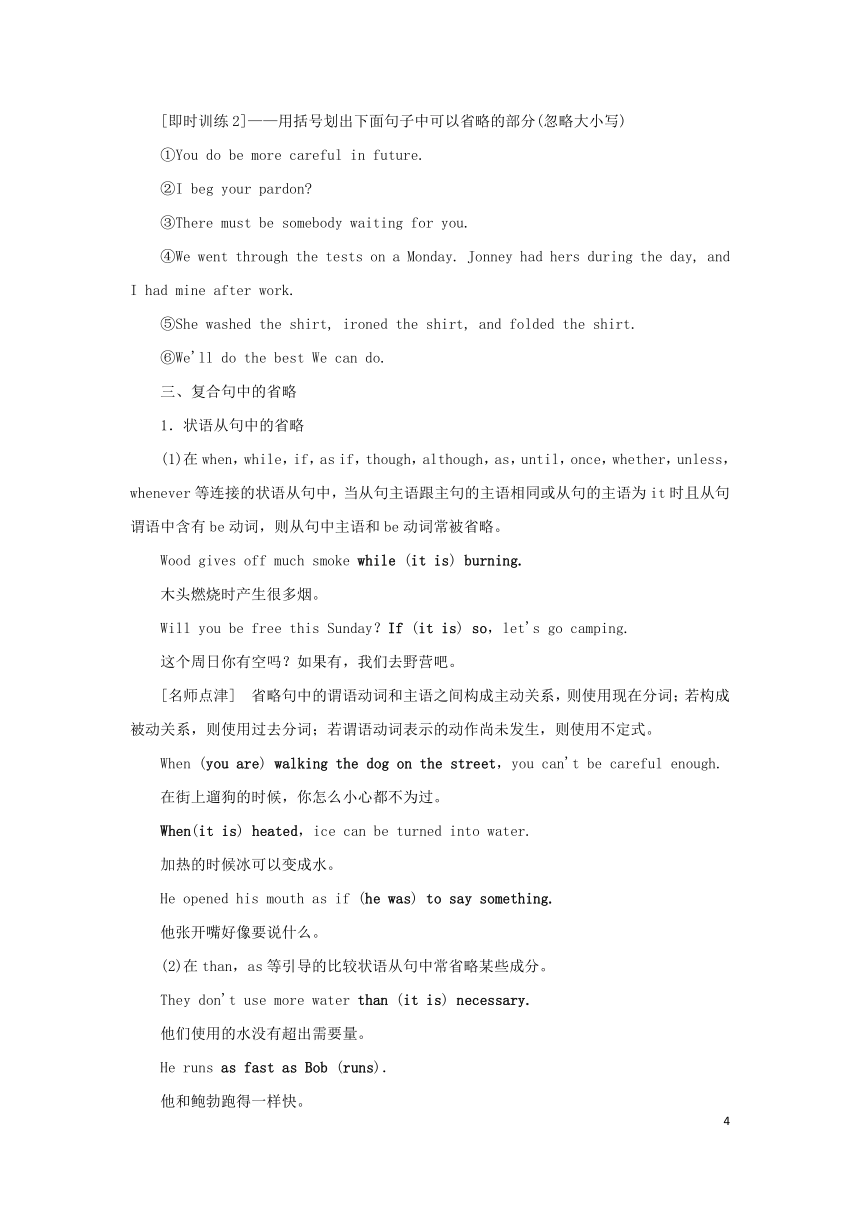人教版(2019)必修 第三册Unit3 Diverse Cultures SectionⅢ Discovering Useful Structures学案(有答案)
文档属性
| 名称 | 人教版(2019)必修 第三册Unit3 Diverse Cultures SectionⅢ Discovering Useful Structures学案(有答案) |  | |
| 格式 | docx | ||
| 文件大小 | 26.2KB | ||
| 资源类型 | 教案 | ||
| 版本资源 | 人教版(2019) | ||
| 科目 | 英语 | ||
| 更新时间 | 2023-03-08 16:47:03 | ||
图片预览




文档简介
Section Ⅲ Discovering Useful Structures
每/日/金/句:Since Qin Dynasty, Chinese various ethnic groups have lived together as a single nation.
自秦朝以来, 中国各民族就作为一个单一国家生活在一起。
语言基础集释
(教材P30)I really like that paper folding book, and my son likes that paper folding book, too.
我真的很喜欢那本折纸书,并且我的儿子也喜欢那本折纸书。
◎fold vt.包;裹;折叠vt. &vi.(可)折小;(可)叠平
(1)fold (up) 折叠;对折
fold one's arms 双臂交叉在胸前
(2)unfold v. 展开
(3)folding adj. 可折叠的
[佳句] He folded up his umbrella as he entered the room.他进屋时把伞折了起来。
[练通]——单句语法填空
①I finished my coffee, ________(fold) my newspaper and stood up.
②As the mist cleared, a most beautiful view ________ (fold) before their eyes.
[写美]——应用文佳句
③那个年轻人双臂交叉躺在沙发上,很快就睡着了。
The young man lay on the sofa __________________and soon fell asleep.
语法专项突破
省略
[自主感知]
①And what a city (it is)—a city that was able to rebuild itself after the earthquake that occurred in 1906.
②My hotel is near downtown,in the Mission District,(which is) one of the oldest parts of the city.
③This district used to be a poor area of town,but (this district) is now a centre for art,music,and food.
④(It is) A real mix of cultures here!
⑤What great food (it is)!
⑥(I) Can't wait!
[我的发现]
(1)被省略的部分为主语的是________。
(2)被省略的部分为主语和谓语(be动词)的是________。
[语法规则]
为了避免重复,或为了使句子更简练,在一些句子中常常省去一个或某几个成分,这种语法现象在英语中叫省略。在英语句子中,常见的省略情况有以下几种:
一、简单句中的省略?
1.省略主语:一般情况下,主语是不能省略的,但在祈使句和其他不容易引起歧义的情况下,特别是在口语中,主语常常省略,主要是祈使句中的you和疑问句中的主语。
(You) Shut up!住嘴!
(You) Want a hand?需要帮忙吗?
(I) Beg your pardon.请再说一遍。
(It) Doesn't matter.没关系。
2.省略宾语:当上、下或前、后两个句子的宾语一致时,下句或后句常省略宾语。
—Do you know Miss Gao
—I don't know (her).
——你认识高女士吗?
——我不认识。
3.省略主语和谓语(或谓语的一部分):在某些具体的场合下,主语和谓语都很明确,此时为了简化或显得亲切等,可将主语和谓语(或谓语的一部分)同时省略,只剩下表语、宾语、状语或其他成分。
(You come) This way,please.
请这边走。(省略了主语和谓语)
(Have you) Got any ink
你有墨水吗?(省略了主语和谓语的一部分)
[即时训练1]——用括号划出句中可以省略的部分(忽略大小写)
①I see you tomorrow.
②What a wonderful victory it is for Tom!
③—Are you feeling better now
—I am feeling much better now.
④The lightning flashed and the thunder crashed.
⑤I consider him to be lazy.
⑥Today I met her at the barber's shop.
⑦—Are you a teacher
—No, but I used to be a teacher.
⑧The heavy rain prevented him from coming.
二、并列句中的省略?
在由and或but连接的并列句中,常省略一些重复的词或词组。
1.省略共同的主语或宾语。
Tom picked up a comic on the floor and (Tom) handed it to his teacher.
汤姆在地板上捡起了一本连环画杂志并把它交给了他的老师。
Jeff broke two eggs into a plate and (Jeff) added in some milk.
杰夫在盘子里打了两个鸡蛋,并加了一些牛奶。[2021·新高考Ⅰ卷]
2.若主语不同,而谓语部分的系动词、助动词或情态动词相同,则省略后面的系动词、助动词或情态动词。
Jack must have been playing football and Mary (must have been) doing her homework.
杰克肯定一直在踢足球,玛丽肯定一直在做家庭作业。
3.若主语和谓语动词都相同,则省略后面的主谓成分。
His claim made me happy,but (his claim made) Jim angry.他的断言使我高兴,却使吉姆生气。
4.若主语不同,但主要动词及后续部分相同,则省略主要动词及后续部分。
He has a knowledge of china but his friend doesn't (have a knowledge of china).
他具备瓷器知识,但他的朋友不具备。
[即时训练2]——用括号划出下面句子中可以省略的部分(忽略大小写)
①You do be more careful in future.
②I beg your pardon
③There must be somebody waiting for you.
④We went through the tests on a Monday. Jonney had hers during the day, and I had mine after work.
⑤She washed the shirt, ironed the shirt, and folded the shirt.
⑥We'll do the best We can do.
三、复合句中的省略?
1.状语从句中的省略
(1)在when,while,if,as if,though,although,as,until,once,whether,unless,whenever等连接的状语从句中,当从句主语跟主句的主语相同或从句的主语为it时且从句谓语中含有be动词,则从句中主语和be动词常被省略。
Wood gives off much smoke while (it is) burning.
木头燃烧时产生很多烟。
Will you be free this Sunday?If (it is) so,let's go camping.
这个周日你有空吗?如果有,我们去野营吧。
[名师点津] 省略句中的谓语动词和主语之间构成主动关系,则使用现在分词;若构成被动关系,则使用过去分词;若谓语动词表示的动作尚未发生,则使用不定式。
When (you are) walking the dog on the street,you can't be careful enough.
在街上遛狗的时候,你怎么小心都不为过。
When(it is) heated,ice can be turned into water.
加热的时候冰可以变成水。
He opened his mouth as if (he was) to say something.
他张开嘴好像要说什么。
(2)在than,as等引导的比较状语从句中常省略某些成分。
They don't use more water than (it is) necessary.
他们使用的水没有超出需要量。
He runs as fast as Bob (runs).
他和鲍勃跑得一样快。
[名师点津] 并非所有的状语从句都可以省略主语和be动词,由after,before,because等词引导的状语从句一般要改写成介词短语、分词短语等,用动名词代替be动词。
Because he was ill,he didn't attend the meeting.
→Because of being ill,he didn't attend the meeting.(正)
→Being ill,he didn't attend the meeting.(正)
→Because ill,he didn't attend the meeting.(误)
由于生病了,他没有出席会议。
2.定语从句中的省略
(1)在限制性定语从句中,作宾语用的关系代词whom,which,that可省略(但whom,which紧跟在介词后时不能省略)。
My husband and I agreed they were the best fruit (that) we had ever eaten.
我丈夫和我都认为它们是我们吃过的最好的水果。[2021·新高考Ⅰ卷]
(2)way表示“方式,方法”时,关系词that/in which可以省略。
The way (that/in which) he speaks to us is really annoying.
他对我们讲话的方式真是让人讨厌。
3.宾语从句中的省略
及物动词后接宾语从句时,连接词that一般可以省略;但如果及物动词接两个或两个以上that引导的宾语从句,那么只有第一个that可以省略。
He said (that) the diagram was very important and that we should learn it by heart.
他说这个图表很重要,我们应该牢记在心。
We hope (that) such attention will excite a greater interest in the scientific and scholarly study of emotion.
我们希望这样的关注能激发人们对情感科学和学术研究更大的兴趣。[2021·新高考Ⅰ卷]
[即时训练3]——写出下列句中能省略的部分
①I believe that she will help you and that you will succeed.________
②Is this the reason that he explained at the meeting for his carelessness in his work?________
③Whenever it is possible,he will come to my help. ________
四、其他情况的省略?
1.动词不定式的省略
(1)当不定式在形容词afraid,anxious,eager,glad,happy,ready,willing等后作状语时,to后的内容常省略。
You can't force him to read the poetry if he's not ready to (read the poetry).
如果他没有准备好阅读这首诗,你不能强迫他。
(2)某些使役动词,如:make,let,have等和感官动词,如:see,watch,notice,observe,hear等后面作宾补的不定式须省略to,但若这些动词用于被动语态,则to不省略。
We often hear her sing an English song in the classroom.
She is often heard to sing an English song in the classroom.(被动语态)
我们经常听见她在教室唱英文歌。
(3)并列的不定式可以省略后面的不定式符号to。但若两个不定式之间表示对比关系时,不能省略to。
He likes to swim more than (to) skate.
比起溜冰他更喜欢游泳。
He believes it important to study rather than to make friends.(比较)
他认为重要的是学习而不是交朋友。
(4)当不定式在某些动词后作宾语时,常可省略。常见的动词有agree,afford,expect,forget,hope,know,manage,pretend,remember,refuse,want,wish,would like等。
You can go with us if you want to (go with us).
如果你想去,你可以和我们一起去。
(5)介词but,except (除了) 前有实义动词do的某种形式时,后面的不定式不带to。
All the chairman could do was nothing but wait and see.主席所能做的只有观望。
(6)当不定式作某些复合谓语时,如be going to,be able to,have to,ought to,used to等,可只保留不定式符号to。
They didn't visit their parents as much as they ought to (visit their parents).
他们应该多看望父母,但他们没有。
[名师点津] 省略的不定式内容若含有作助动词用的have或be的任何形式时,to后要保留原形的have或be。类似这样用法的还有动词短语ought to,be going to,be about to,be supposed to,have to,used to及形容词glad,happy,pleased,delighted等。
He didn't come,but he ought to have.
他没来,但他应该来。
—Are you a physician
—No,but I used to be (a physician).
——你是个内科医生吗?
——不是,但我过去是。
2.使用so,not等时的省略
在英语中,可以用so,not或其他方式来省略上文或问句中的一部分或整个句子。
—Can you finish your work today
—I think so./I don't think so./I think not.
——你今天能完成工作吗?
——我认为能。/我认为不能。
[名师点津] hope,guess,be afraid的否定形式只能用not的形式,不能用not...so的形式。
—The boys are not doing a good job at all,are they
—I guess not.
——这些男孩做得一点儿也不好,是吗?
——我猜是没做好。
3.介词的省略
一些与动词、名词或形容词搭配的介词常常可以省略,而保留介词后的动名词。常见的结构有:
(1)have difficulty/trouble (in) doing sth.
(2)be busy (in) doing sth.
(3)spend some time (in) doing sth.
(4)stop/prevent sb.(from) doing sth.
The heavy rain prevented him (from) arriving there on time.
大雨使得他没能按时到达那里。
[即时训练4]——补全下列句中省略的介词
①It was quite light and (________) any moment now the sun would rise.
②There were plenty of empty seats (________) that night.
③I have some trouble (________) learning English.
Section Ⅲ Discovering Useful Structures
Part 1 语言基础集释
①folded ②unfolded ③with his arms folded
Part 2 语法专项突破
省略
[我的发现]
(1)③⑥
(2)①②④⑤
[即时训练1]
①I ②it is ③I am feeling ④第二个the ⑤to be ⑥shop ⑦第二句中的a teacher ⑧from
[即时训练2]
①You ②I ③There ④第二个had ⑤the shirt the shirt ⑥第二个do
[即时训练3]
①第一个that ②that ③it is
[即时训练4]
①at ②on ③in
1
每/日/金/句:Since Qin Dynasty, Chinese various ethnic groups have lived together as a single nation.
自秦朝以来, 中国各民族就作为一个单一国家生活在一起。
语言基础集释
(教材P30)I really like that paper folding book, and my son likes that paper folding book, too.
我真的很喜欢那本折纸书,并且我的儿子也喜欢那本折纸书。
◎fold vt.包;裹;折叠vt. &vi.(可)折小;(可)叠平
(1)fold (up) 折叠;对折
fold one's arms 双臂交叉在胸前
(2)unfold v. 展开
(3)folding adj. 可折叠的
[佳句] He folded up his umbrella as he entered the room.他进屋时把伞折了起来。
[练通]——单句语法填空
①I finished my coffee, ________(fold) my newspaper and stood up.
②As the mist cleared, a most beautiful view ________ (fold) before their eyes.
[写美]——应用文佳句
③那个年轻人双臂交叉躺在沙发上,很快就睡着了。
The young man lay on the sofa __________________and soon fell asleep.
语法专项突破
省略
[自主感知]
①And what a city (it is)—a city that was able to rebuild itself after the earthquake that occurred in 1906.
②My hotel is near downtown,in the Mission District,(which is) one of the oldest parts of the city.
③This district used to be a poor area of town,but (this district) is now a centre for art,music,and food.
④(It is) A real mix of cultures here!
⑤What great food (it is)!
⑥(I) Can't wait!
[我的发现]
(1)被省略的部分为主语的是________。
(2)被省略的部分为主语和谓语(be动词)的是________。
[语法规则]
为了避免重复,或为了使句子更简练,在一些句子中常常省去一个或某几个成分,这种语法现象在英语中叫省略。在英语句子中,常见的省略情况有以下几种:
一、简单句中的省略?
1.省略主语:一般情况下,主语是不能省略的,但在祈使句和其他不容易引起歧义的情况下,特别是在口语中,主语常常省略,主要是祈使句中的you和疑问句中的主语。
(You) Shut up!住嘴!
(You) Want a hand?需要帮忙吗?
(I) Beg your pardon.请再说一遍。
(It) Doesn't matter.没关系。
2.省略宾语:当上、下或前、后两个句子的宾语一致时,下句或后句常省略宾语。
—Do you know Miss Gao
—I don't know (her).
——你认识高女士吗?
——我不认识。
3.省略主语和谓语(或谓语的一部分):在某些具体的场合下,主语和谓语都很明确,此时为了简化或显得亲切等,可将主语和谓语(或谓语的一部分)同时省略,只剩下表语、宾语、状语或其他成分。
(You come) This way,please.
请这边走。(省略了主语和谓语)
(Have you) Got any ink
你有墨水吗?(省略了主语和谓语的一部分)
[即时训练1]——用括号划出句中可以省略的部分(忽略大小写)
①I see you tomorrow.
②What a wonderful victory it is for Tom!
③—Are you feeling better now
—I am feeling much better now.
④The lightning flashed and the thunder crashed.
⑤I consider him to be lazy.
⑥Today I met her at the barber's shop.
⑦—Are you a teacher
—No, but I used to be a teacher.
⑧The heavy rain prevented him from coming.
二、并列句中的省略?
在由and或but连接的并列句中,常省略一些重复的词或词组。
1.省略共同的主语或宾语。
Tom picked up a comic on the floor and (Tom) handed it to his teacher.
汤姆在地板上捡起了一本连环画杂志并把它交给了他的老师。
Jeff broke two eggs into a plate and (Jeff) added in some milk.
杰夫在盘子里打了两个鸡蛋,并加了一些牛奶。[2021·新高考Ⅰ卷]
2.若主语不同,而谓语部分的系动词、助动词或情态动词相同,则省略后面的系动词、助动词或情态动词。
Jack must have been playing football and Mary (must have been) doing her homework.
杰克肯定一直在踢足球,玛丽肯定一直在做家庭作业。
3.若主语和谓语动词都相同,则省略后面的主谓成分。
His claim made me happy,but (his claim made) Jim angry.他的断言使我高兴,却使吉姆生气。
4.若主语不同,但主要动词及后续部分相同,则省略主要动词及后续部分。
He has a knowledge of china but his friend doesn't (have a knowledge of china).
他具备瓷器知识,但他的朋友不具备。
[即时训练2]——用括号划出下面句子中可以省略的部分(忽略大小写)
①You do be more careful in future.
②I beg your pardon
③There must be somebody waiting for you.
④We went through the tests on a Monday. Jonney had hers during the day, and I had mine after work.
⑤She washed the shirt, ironed the shirt, and folded the shirt.
⑥We'll do the best We can do.
三、复合句中的省略?
1.状语从句中的省略
(1)在when,while,if,as if,though,although,as,until,once,whether,unless,whenever等连接的状语从句中,当从句主语跟主句的主语相同或从句的主语为it时且从句谓语中含有be动词,则从句中主语和be动词常被省略。
Wood gives off much smoke while (it is) burning.
木头燃烧时产生很多烟。
Will you be free this Sunday?If (it is) so,let's go camping.
这个周日你有空吗?如果有,我们去野营吧。
[名师点津] 省略句中的谓语动词和主语之间构成主动关系,则使用现在分词;若构成被动关系,则使用过去分词;若谓语动词表示的动作尚未发生,则使用不定式。
When (you are) walking the dog on the street,you can't be careful enough.
在街上遛狗的时候,你怎么小心都不为过。
When(it is) heated,ice can be turned into water.
加热的时候冰可以变成水。
He opened his mouth as if (he was) to say something.
他张开嘴好像要说什么。
(2)在than,as等引导的比较状语从句中常省略某些成分。
They don't use more water than (it is) necessary.
他们使用的水没有超出需要量。
He runs as fast as Bob (runs).
他和鲍勃跑得一样快。
[名师点津] 并非所有的状语从句都可以省略主语和be动词,由after,before,because等词引导的状语从句一般要改写成介词短语、分词短语等,用动名词代替be动词。
Because he was ill,he didn't attend the meeting.
→Because of being ill,he didn't attend the meeting.(正)
→Being ill,he didn't attend the meeting.(正)
→Because ill,he didn't attend the meeting.(误)
由于生病了,他没有出席会议。
2.定语从句中的省略
(1)在限制性定语从句中,作宾语用的关系代词whom,which,that可省略(但whom,which紧跟在介词后时不能省略)。
My husband and I agreed they were the best fruit (that) we had ever eaten.
我丈夫和我都认为它们是我们吃过的最好的水果。[2021·新高考Ⅰ卷]
(2)way表示“方式,方法”时,关系词that/in which可以省略。
The way (that/in which) he speaks to us is really annoying.
他对我们讲话的方式真是让人讨厌。
3.宾语从句中的省略
及物动词后接宾语从句时,连接词that一般可以省略;但如果及物动词接两个或两个以上that引导的宾语从句,那么只有第一个that可以省略。
He said (that) the diagram was very important and that we should learn it by heart.
他说这个图表很重要,我们应该牢记在心。
We hope (that) such attention will excite a greater interest in the scientific and scholarly study of emotion.
我们希望这样的关注能激发人们对情感科学和学术研究更大的兴趣。[2021·新高考Ⅰ卷]
[即时训练3]——写出下列句中能省略的部分
①I believe that she will help you and that you will succeed.________
②Is this the reason that he explained at the meeting for his carelessness in his work?________
③Whenever it is possible,he will come to my help. ________
四、其他情况的省略?
1.动词不定式的省略
(1)当不定式在形容词afraid,anxious,eager,glad,happy,ready,willing等后作状语时,to后的内容常省略。
You can't force him to read the poetry if he's not ready to (read the poetry).
如果他没有准备好阅读这首诗,你不能强迫他。
(2)某些使役动词,如:make,let,have等和感官动词,如:see,watch,notice,observe,hear等后面作宾补的不定式须省略to,但若这些动词用于被动语态,则to不省略。
We often hear her sing an English song in the classroom.
She is often heard to sing an English song in the classroom.(被动语态)
我们经常听见她在教室唱英文歌。
(3)并列的不定式可以省略后面的不定式符号to。但若两个不定式之间表示对比关系时,不能省略to。
He likes to swim more than (to) skate.
比起溜冰他更喜欢游泳。
He believes it important to study rather than to make friends.(比较)
他认为重要的是学习而不是交朋友。
(4)当不定式在某些动词后作宾语时,常可省略。常见的动词有agree,afford,expect,forget,hope,know,manage,pretend,remember,refuse,want,wish,would like等。
You can go with us if you want to (go with us).
如果你想去,你可以和我们一起去。
(5)介词but,except (除了) 前有实义动词do的某种形式时,后面的不定式不带to。
All the chairman could do was nothing but wait and see.主席所能做的只有观望。
(6)当不定式作某些复合谓语时,如be going to,be able to,have to,ought to,used to等,可只保留不定式符号to。
They didn't visit their parents as much as they ought to (visit their parents).
他们应该多看望父母,但他们没有。
[名师点津] 省略的不定式内容若含有作助动词用的have或be的任何形式时,to后要保留原形的have或be。类似这样用法的还有动词短语ought to,be going to,be about to,be supposed to,have to,used to及形容词glad,happy,pleased,delighted等。
He didn't come,but he ought to have.
他没来,但他应该来。
—Are you a physician
—No,but I used to be (a physician).
——你是个内科医生吗?
——不是,但我过去是。
2.使用so,not等时的省略
在英语中,可以用so,not或其他方式来省略上文或问句中的一部分或整个句子。
—Can you finish your work today
—I think so./I don't think so./I think not.
——你今天能完成工作吗?
——我认为能。/我认为不能。
[名师点津] hope,guess,be afraid的否定形式只能用not的形式,不能用not...so的形式。
—The boys are not doing a good job at all,are they
—I guess not.
——这些男孩做得一点儿也不好,是吗?
——我猜是没做好。
3.介词的省略
一些与动词、名词或形容词搭配的介词常常可以省略,而保留介词后的动名词。常见的结构有:
(1)have difficulty/trouble (in) doing sth.
(2)be busy (in) doing sth.
(3)spend some time (in) doing sth.
(4)stop/prevent sb.(from) doing sth.
The heavy rain prevented him (from) arriving there on time.
大雨使得他没能按时到达那里。
[即时训练4]——补全下列句中省略的介词
①It was quite light and (________) any moment now the sun would rise.
②There were plenty of empty seats (________) that night.
③I have some trouble (________) learning English.
Section Ⅲ Discovering Useful Structures
Part 1 语言基础集释
①folded ②unfolded ③with his arms folded
Part 2 语法专项突破
省略
[我的发现]
(1)③⑥
(2)①②④⑤
[即时训练1]
①I ②it is ③I am feeling ④第二个the ⑤to be ⑥shop ⑦第二句中的a teacher ⑧from
[即时训练2]
①You ②I ③There ④第二个had ⑤the shirt the shirt ⑥第二个do
[即时训练3]
①第一个that ②that ③it is
[即时训练4]
①at ②on ③in
1
